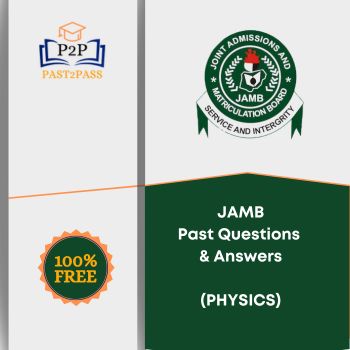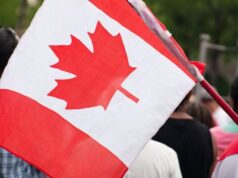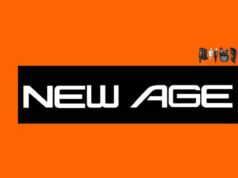Message us on Twitter; we would love to connect! Follow @Past2Pass
— Past2Pass - P2P (@Past2Pass) September 8, 2025
Practice Physics Jamb Question and Answer to prepare for the UTME exams ahead. The download is free and in PDF format.
Working through these past questions and answers is a great way to boost your confidence and increase your chances of success.
The Joint Admissions and Matriculation Board (JAMB) exam consists of 180 questions, with 40 questions dedicated to the physics. It’s important to study past questions for guidance to pass the exam.
Structure of the Physics JAMB Question Section
A Physics JAMB question section is structured as a set of multiple-choice questions (MCQs) covering a broad range of physics topics from the JAMB syllabus, with each question presenting four answer options, requiring the candidate to select the correct one. Click here to read jamb physics syllabus.
Physics JAMB Past Questions and Answers
We have created 20 questions for you to practice. These questions have been selected from previous use of mathematics jamb questions from year 1983 – 2004.
You can proceed directly to download the JAMB past questions and answers below for free.
1) The SI unit of force is …
A. kilogram
B. pascal
C. watt
D. newton
2) Which of the following quantities is a vector?
A. Mass (kg)
B. Volume (m³)
C. Speed (m/s)
D. Acceleration (m/s²)
3) The first law of thermodynamics, also known as the law of energy conservation, states that energy can neither be created nor destroyed, but can only be …
A. converted from one form to another
B. transformed into mass
C. transferred between objects
D. stored as potential energy
4) The acceleration due to gravity on the surface of the Earth is approximately …
A. 6.7 m/s²
B. 7.8 m/s²
C. 8.9 m/s²
D. 9.8 m/s²
5) Atmospheric pressure is typically measured using a …
A. hydrometer
B. barometer
C. hygrometer
D. thermometer

6) Which of the following is NOT a primary color of light?
A. Green
B. Blue
C. Yellow
D. Red
7) The escape velocity from the surface of the Earth is approximately …
A. 8 km/s
B. 20 km/s
C. 15 km/s
D. 11 km/s
8) The bending of light as it passes from one medium to another is known as …
A. reflection
B. refraction
C. dispersion
D. diffraction
9) The SI unit of electric charge is …
A. ohm
B. coulomb
C. ampere
D. volt
10) Ohm’s Law states that the current through a conductor is directly proportional to the voltage across it and is represented by the formula …
A. V = IR
B. P = IV
C. Q = It
D. E = mc²
11) If a wave has a period of 0.02 seconds, its frequency is …
A. 20 Hz
B. 200 Hz
C. 100 Hz
D. 50 Hz
12) The power dissipated in a resistor in an electric circuit is given by the formula …
A. P = IV
B. P = I²R
C. P = V²/R
D. All of the above
13) The amount of work done when a force of 10 N moves an object 5 meters is …
A. 2 J
B. 100 J
C. 50 J
D. 15 J
14) A device that converts mechanical energy into electrical energy is called a …
A. rectifier
B. generator
C. transformer
D. motor
15) The process of splitting a heavy nucleus into two lighter nuclei is called …
A. fusion
B. fission
C. ionization
D. radioactivity
16) Which of the following is a renewable energy source?
A. coal
B. natural gas
C. nuclear energy
D. solar energy
17) The phenomenon where an object floats or sinks in a fluid is explained by …
A. Archimedes’ Principle
B. Pascal’s Principle
C. Newton’s Third Law
D. Bernoulli’s Principle
18) The energy possessed by a body due to its motion is called …
A. chemical energy
B. kinetic energy
C. thermal energy
D. potential energy
19) The pressure exerted by a gas on the walls of its container is due to …
A. the collisions of gas molecules with the walls
B. the volume of the gas
C. the mass of the gas
D. the temperature of the gas
20) The resistance of a conductor is directly proportional to …
A. its length (m)
B. the voltage across it (V)
C. the current through it (A)
D. its area of cross-section (m²)
Benefits of Practicing with JAMB Use of English Past Questions
Here’s is key benefits of practicing with past questions before the exam.
Understand the Exam Format
Reviewing past questions reveals the exam’s structure. You’ll become familiar with the types of comprehension passages, grammatical rules, and vocabulary that are tested.
Speed Improvement
Regular practice will help you manage your time more effectively during the exam. You will become adept at solving questions quickly and accurately.
Boost Your Confidence
By answering real exam questions from previous years, you can reduce anxiety. This preparation will make you feel more ready and confident on exam day.
Identify Key Topics
Many topics in JAMB are repeated across different years. Practicing past questions will help you concentrate on the important subjects.
Jamb Physics Past Questions and Answers Pdf Download
Click the button below to Download Free PDF of Physics Jamb Past Question and Answer.
Wishing you good luck!









